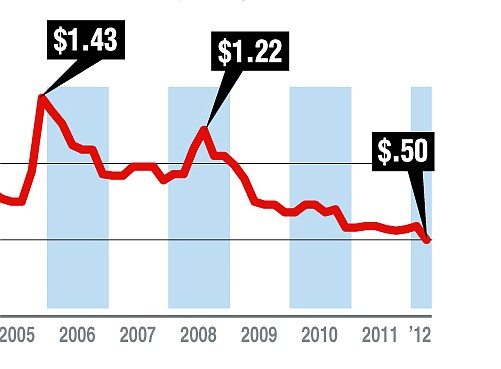Chattanooga Gas Co. is cutting its rates again today after a mild winter and swollen supplies of natural gas supplies continue to reduce the price of gas.
The typical Chattanooga homeowner who heats with natural gas should save about $53 in the next year under the new purchased rate adjustment approved by the Tennessee Regulatory Authority. Effective today, the commodity fuel portion of a typical Chattanooga Gas bill will drop by 14.2 percent to the lowest level since 2002.
"We've had one of the mildest winters in 80 years, and the new gas supplies opened up by new methods of hydraulic fracking have dramatically changed the gas market from where it was a few years ago," said Steve Lindsey, the president of Southern operations for Atlanta Gas Light, Chattanooga Gas and Florida City Gas.
Chattanooga Gas Co., which delivers gas to more than 63,000 customers in Hamilton and Bradley counties, makes purchased gas adjustments periodically to reflect the price of the fuel, which accounts for 75 to 80 percent of the typical gas bill. Chattanooga Gas Co.'s rates to distribute and deliver the gas will not change.
Today's price cut in the commodity price of fuel will reduce the total gas bill for an average consumer in Chattanooga by about 10 percent and reduce the delivered price of natural gas locally to only about half of the peak level reached in November 2005 after Hurricane Katrina disrupted natural gas deliveries in the Gulf of Mexico.
Rate reductions in gas over the past four years have combined to lower the cost of operating gas-fired furnaces, water heaters and stoves for homeowners to less than half the comparable rates for electric-powered furnaces and appliances, according to AGL Resources, the parent company of Chattanooga Gas. Lindsey said the growing price advantage for gas should help gas utilities pick up a bigger share of the residential market in competition with electricity or propane fuel.
"We've always said that gas heating of a home is more comfortable, reliable and efficient than electric or other fuels," Lindsey said. "But now when you add the price advantage gas now has, to me it's a slam dunk."
Cheaper gas is especially beneficial for fertilizer, chemical and energy-intensive industries that rely on natural gas for manufacturing.
"Any rate reduction is welcome, especially in the current environment," said Tim Spires, president of the Chattanooga Regional Manufacturers Association.
Gas distributors hope to capitalize on the cheaper fuel also to entice more motorists to consider using natural gas to fuel their cars and trucks. AT&T, UPS, Waste Management Co. and other companies with truck fleets have begun converting their vehicles to compressed natural gas to run on cheaper and cleaner fuel.
Pat Riley, general manager of the Gibson County Utility Gas and a member of the executive board of the Tennessee Gas Association, said he hopes natural gas soon will replace gasoline in many vehicles.
"I've been in the gas business for 31 years, and I'm more excited than I have ever been," he said. "With the new fracking technology, we have an estimated 100- to 125-year supply of plentiful gas, and using that in new ways could help clean our environment and reduce our dependence on imported oil."
